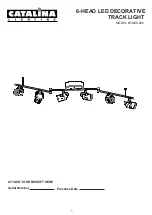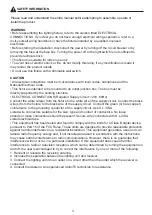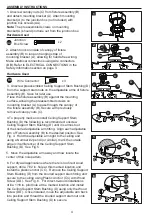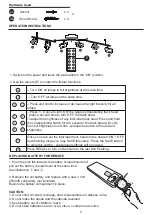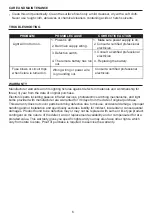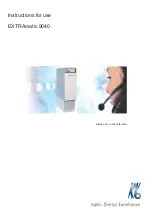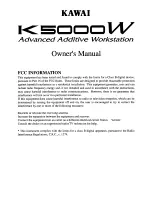
3
SAFETY INFORMATION
WARNING
• Before assembling the lighting fixture, refer to the caution titled ELECTRICAL
CONNECTIONS. If you feel you do not have enough electrical wiring experience, refer to a
•
do-it-yourself wiring handbook or have the fixture installed by a qualified, licensed
electrician.
• Before starting the installation, disconnect the power by turning off the circuit breaker or by
removing the fuse at the fuse box. Turning the power off to the light switch is not sufficient to
prevent electrical shock.
• This fixture is suitable for indoor use only.
• To avoid risk of electric shock or fire, do not modify this lamp; if any modification is made it
may render the product unsafe.
• Do not use this fixture with a dimmable wall switch.
CAUTION
• All electrical connections must be in accordance with local codes, ordinances and the
National Electrical Code.
• This fixture is intended to be mounted to an outlet junction box. The box must be
directly supported by the building structure.
• ELECTRICAL CONNECTIONS (Required Supply Circuit: 120V, 60Hz)
Connect the white wire(s) from the fixture to the white wire of the supply circuit. Connect the black
wire(s) from the fixture to the black wire of the supply circuit. Connect the green (or bare copper)
colored wire to the grounding conductor of the supply circuit. Use U.L./CSA
Listed wire connectors suitable for the size, type and number of conductors. No loose
strands or loose connections should be present. Secure wire connectors with U.L./CSA
Listed electrical tape.
•
This equipment has been tested and found to comply with the limits for a Class B digital device,
pursuant to Part 15 of the FCC Rules. These limits are designed to provide reasonable protection
against harmful interference in a residential installation. This equipment generates, uses and can
radiate radio frequency energy and, if not installed and used in accordance with the instructions,
may cause harmful interference to radio communications. However, there is no guarantee that
interference will not occur in a particular installation. If this equipment does cause harmful
interference to radio or television reception, which can be determined by turning the equipment on
and off, the user isencouraged to try to correct the interference by one or more of the following:
1. Reorient or relocate the receiving antenna.
2. Increase the separation between the lighting unit and receiver.
3. Connect the lighting unit into an outlet on a circuit other than the outlet which the receiver is
connected.
4. Consult the dealer or an experienced radio/TV technician for assistance.
Please read and understand the entire manual before attempting to assemble, operate or
install the product.

